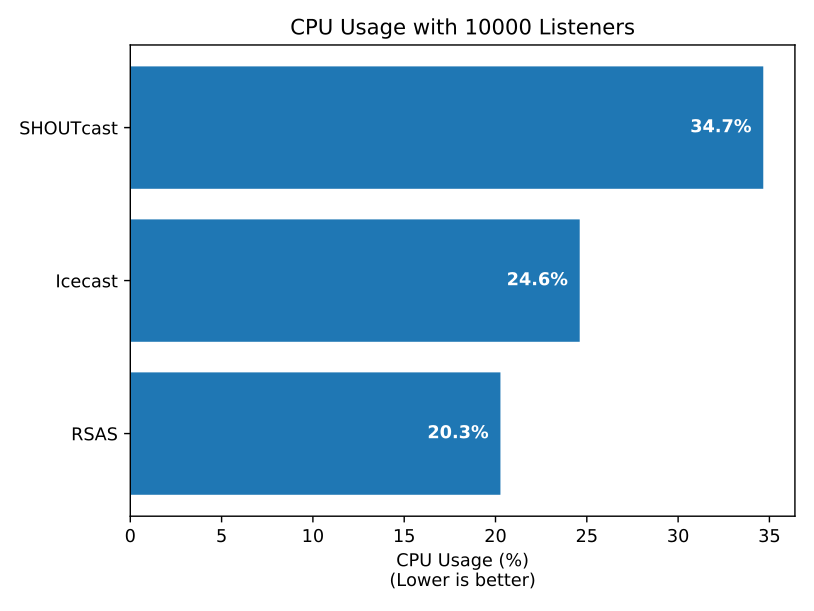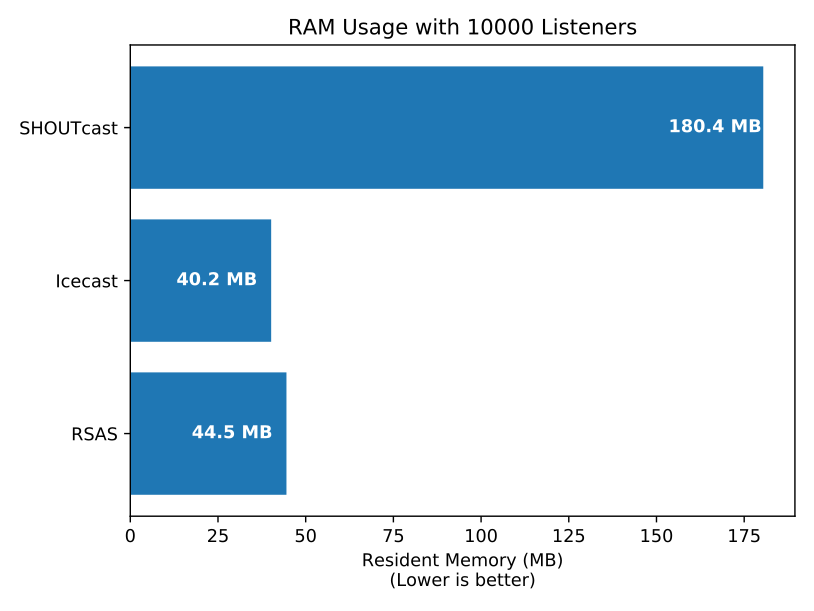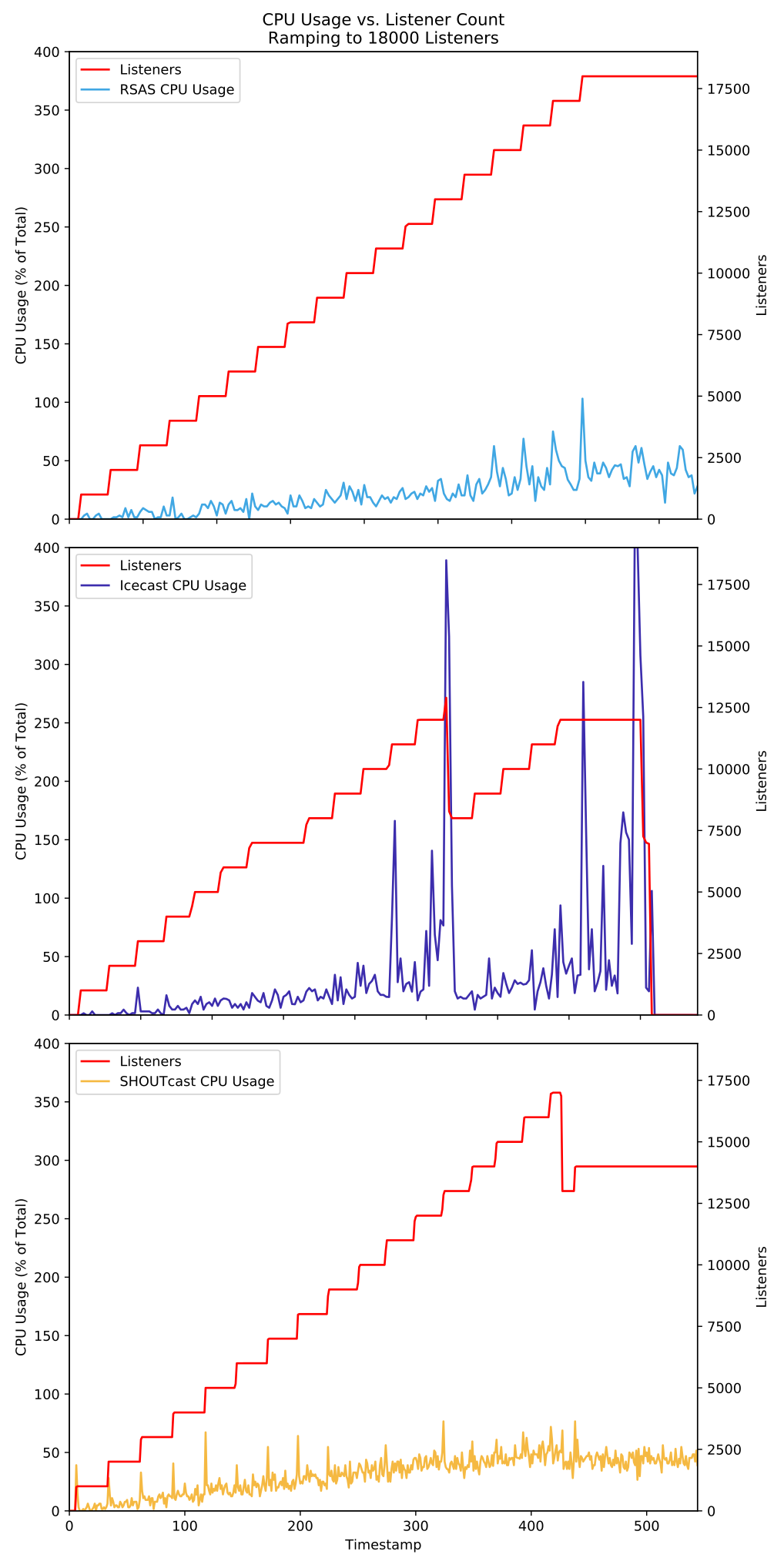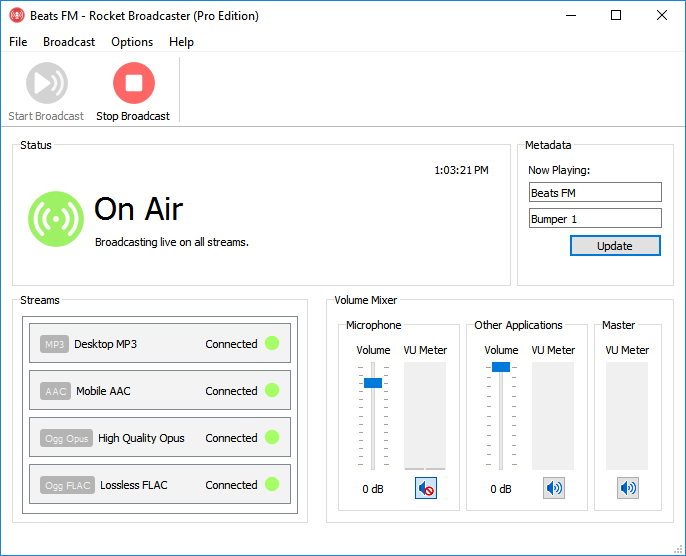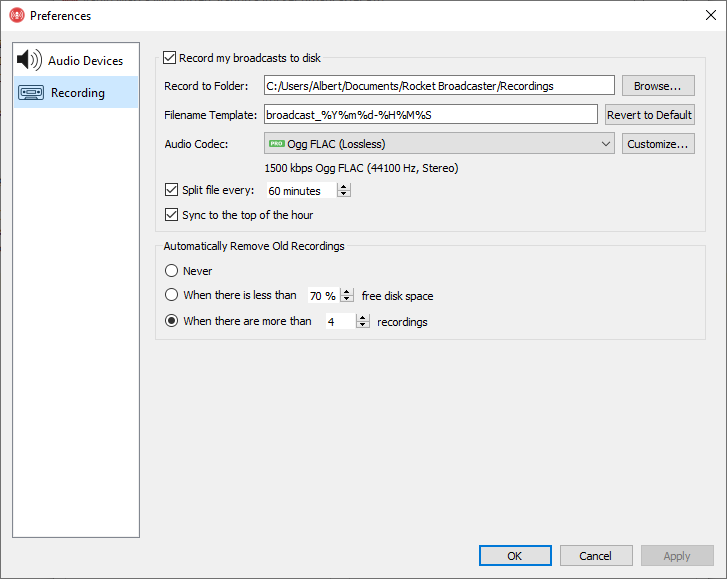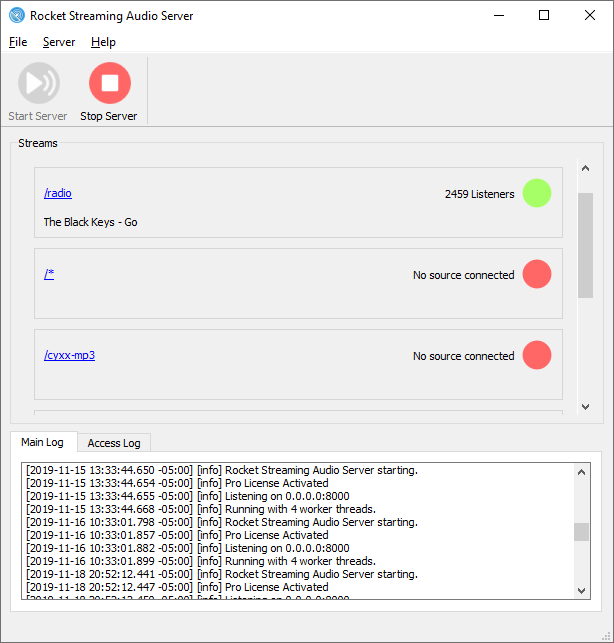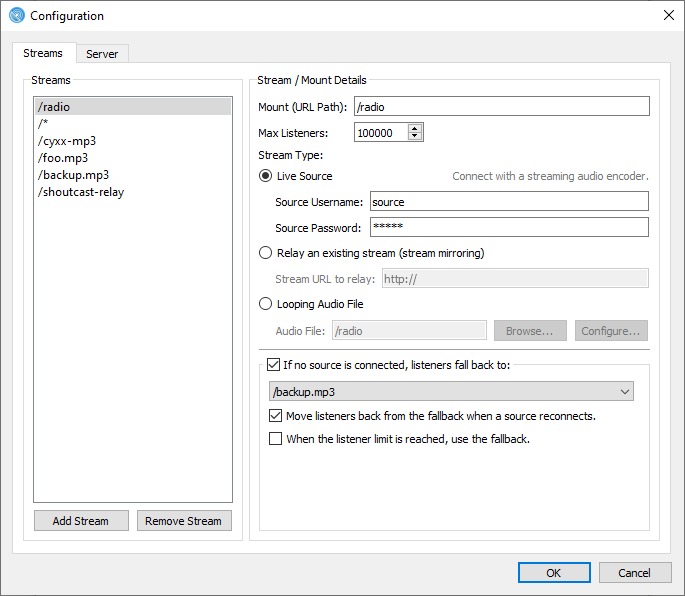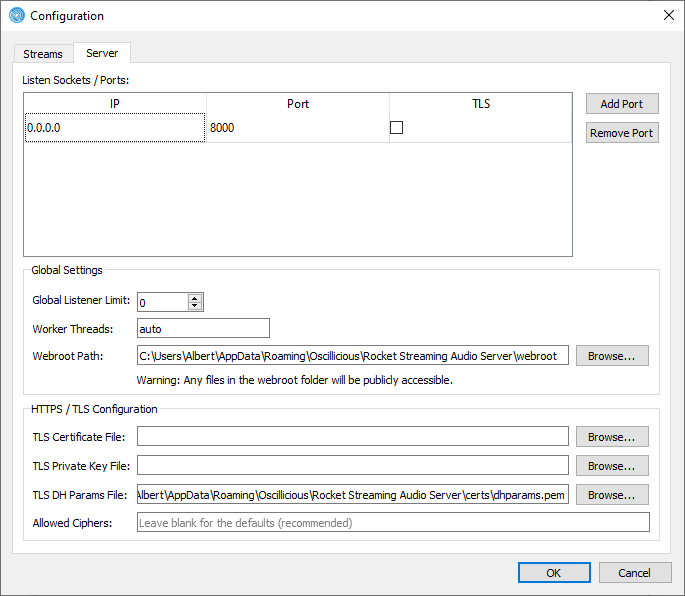We're pleased to introduce the Rocket Streaming Audio Server (RSAS),
our new software to deliver high quality streaming audio over the web. RSAS offers broadcasters lower latency, excellent compatibility with
encoders and players, and compatibility with popular codecs like MP3, AAC, AAC+, Ogg Opus, and Ogg FLAC. Our live streaming metadata,
and compatibility with HTML5 Media Source Extensions
make it easier to build better in-browser players for radio too.
We're excited to offer broadcasters
this new streaming server software as an alternative to Icecast and SHOUTcast, giving professional radio stations the stability they need to stream online.
Drop-in Icecast Replacement
To make things easy, RSAS is designed as a "drop-in replacement" for Icecast, meaning it's compatible with your existing Icecast configuration file, encoder, and players.
It even writes logs in the same format, for compatibility with listener statistics or reporting software. If you're encountering bugs or crashes with Icecast, you can easily switch over to RSAS and try it out.
Read more about migrating from Icecast to RSAS.
SHOUTcast Alternative
SHOUTcast users might have noticed that SHOUTcast is now charging a monthly fee for features that were previously free, and has locked down
their free version of SHOUTcast to only be compatible with 128 kbps MP3 streams, removed backup URLs, and imposed other restrictions.
We have good news for small broadcasters - The Free Edition of RSAS has no codec or bitrate restrictions, and serves up to 100 concurrent
listeners. You can broadcast AAC or even lossless Ogg FLAC, with fallback streams, for free, making RSAS a great alternative to SHOUTcast.
Read more about migrating from SHOUTcast to RSAS.
Why we built Rocket Streaming Audio Server
We developed RSAS after running into several major issues with Icecast and Icecast-KH that became apparent
at the scale that the Radio Mast Streaming Network operates at.
We're obsessed with reliability, and our up-to-the-minute monitoring detected subtle issues that were leading to a worse
listener experience. Coincidentally, many of our Rocket Broadcaster users approached us
after running into similar problems and were looking for a new alternative to Icecast or SHOUTcast.
We decided to forge our own streaming server software internally for Radio Mast to deliver on our vision of a rock-solid global streaming audio CDN,
and RSAS was born. Keeping compatibility with Icecast ensured migrating our infrastructure was easy and seamless, and invisible to our broadcasters
and listeners (beyond the reliability improvements).
We're excited to share our new streaming technology with the wider broadcasting community, and aim to use the combination
of our streaming audio encoder and RSAS to deliver solutions to some long-standing problems
with online streaming audio. Keep watching this blog for more news in the future.
📡 Downloads and Getting Started
RSAS is available today as a free download for Linux, and can handle up to 100 concurrent listeners.
An RSAS Pro license can handle up to 1 million concurrent listeners, and is available starting today from our shop.
RSAS for Windows is currently available as a private beta. Please send us an email if you'd like to try it out.
(We're currently developing a user interface for RSAS for Windows to make administration easy, but the streaming server itself is complete.)
We recommend taking a quick skim over our documentation after you download RSAS.
If you don't already have an Icecast installation, you'll need to create a configuration file, and you can start with one of our examples.
📝 FAQ
Is this an Icecast fork? Why not just contribute to Icecast?
No, RSAS was written from scratch in C++, and is not an Icecast fork. We opted to build our own server because the Icecast project
has a different set of priorities from what broadcasters have been asking for. For example, Icecast doesn't officially support MP3 or AAC,
and the developers are hostile towards those codecs (1, 2)
for over a decade.
On the other hand, we've made supporting the two most popular codecs in the world our top priority for RSAS, so even advanced
features like relays and fallback streams work great with MP3 and AAC.
What are some specific problems you ran into with Icecast and Icecast-KH?
For starters, on-demand relays are completely broken in Icecast and Icecast-KH, making it difficult to build a bandwidth-efficient CDN with Icecast.
Relays with Icecast also add large latency (10 seconds or more per server), so having multiple relays pull from each other
compounds your latency, leading to massive latencies (eg. 45 seconds) between the broadcaster and the listener. This is a common downside
of existing streaming audio CDNs today, and we designed RSAS to eliminate the relay latency, so each server only adds about 1 second (or less)
of latency.
Poor support for AAC overall was another factor (eg. fallbacks with AACs kick listeners).
There's also this unfortunate tendency for "certain old versions" of Icecast or Icecast-KH to be the magic
stable versions that everybody uses, but only the people "in the know" know what they are. Often, the newest version would crash or have memory leaks. The lack of quality control has lead to major
features like FLV wrapping being quietly broken in the latest release of Icecast-KH (kh10 to kh12). The confusing, undocumented, divergence of Iceast and Icecast-KH
(where's a comparison?) has left the two projects with different levels of compatibility, stability, security, and maintenance, none of which
is clear or apparent at all to users.
As developers of broadcast software for radio, people trust us to deliver rock solid solutions that run for years without intervention.
Based on our experience running dozens of streaming servers for many years, the disarray of the Icecast and Icecast-KH projects, and even SHOUTcast,
has made them incapable of delivering the reliability broadcasters need. It's our job to deliver software that lets you focus on running your radio station,
and not worry about your servers, and that's exactly what RSAS does.
How is RSAS better than Icecast?
Even from our first release, there's a couple key advantages of RSAS over Icecast:
- Lower latency - RSAS uses a different networking model under the hood to accelerate delivery of audio to your listeners, leading to lower
latencies, usually around 4 seconds. We're working on making this adaptable and automatically tune itself in the future for even lower latenices.
- Easy Streaming Metadata - Getting live metadata from your stream onto your website is easier with RSAS, as it offers push / streaming
metadata that you can easily read from JavaScript.
- Consistent Metadata Support - RSAS supports in-stream ICY metadata across all codecs. We've heard from broadcasters that the lack of ICY metadata support in Icecast has
hindered Opus and FLAC adoption and made integration with players more difficult.
For more information, we've made a more detailed comparison between Icecast and RSAS in
our guide to migration from Icecast to RSAS.
Why would I pay for RSAS Pro?
Besides raising the listener limit, an RSAS Pro license gives you the peace of mind of running supported software. That means if you find a bug or have a problem, we're here
to help you and solve it. Our paid licensing model for RSAS allows us to dedicate developers to the project and deliver a high
quality product and support that you can count on.
Other free streaming servers are "community supported", which is a nice way of saying "not supported". If you find a bug in Icecast,
there's no dedicated developers available to fix it. Your radio station's problems are at the whim of whenever one of their developers
gets around to fixing it.
If you're serious about your radio station, especially commercial radio, RSAS Pro is for you.
Is there a hosted option for RSAS?
📧 Feedback and Feature Suggestions
Got an idea you'd like to see in our streaming audio server? We'd love to hear from you.
We're actively working on the next set of features and your feedback will help us prioritize our roadmap.

